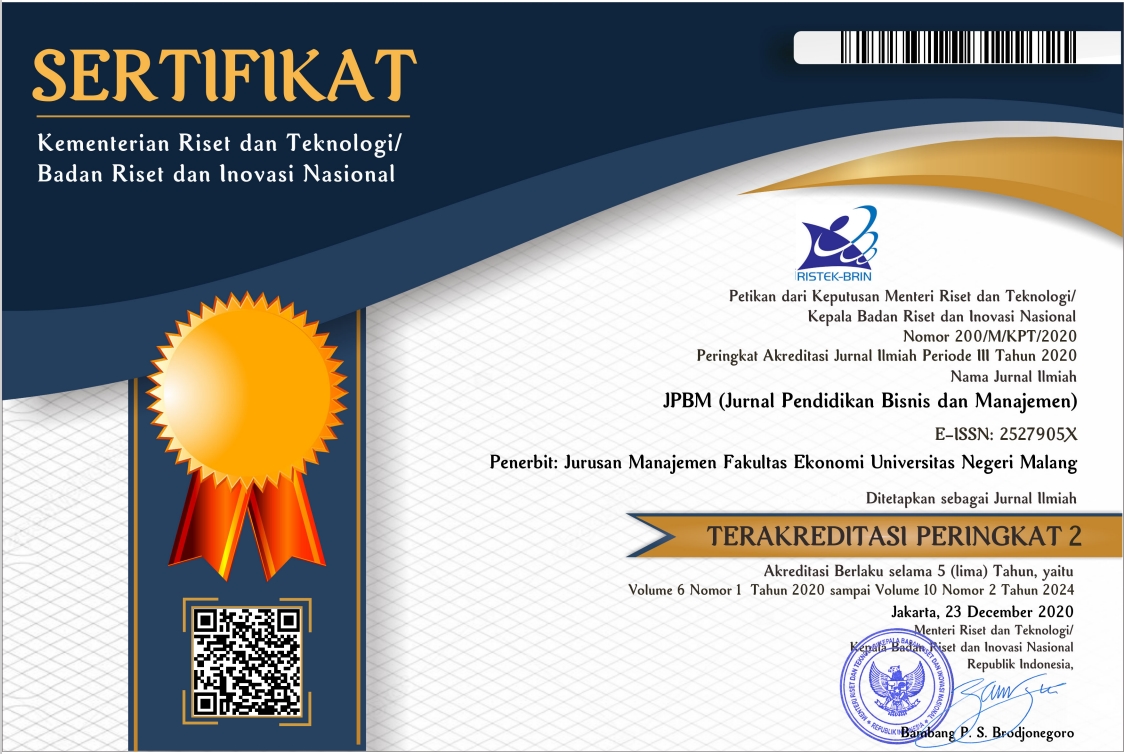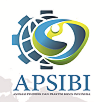Capacity Building Needs of Business Education Lecturers for Efficient Lecturing in Federal Colleges of Education in North Western States, Nigeria
Abstract
The study empirically investigates how professional business education lecturers in Federal Colleges of Education in Nigeria’s North-western needed to be strengthened. The study was guided by two research questions and two null hypotheses were formulated at 0.05 level of significance. The study used a descriptive survey design. The population of this study was 126 professional business educators from six Federal Colleges of Education in North-western State, Nigeria. Research experts validated the instrument. The researchers used Cronbach Alpha method to determine the instrument’s reliability and a reliability coefficient of 0.93 was then obtained. The questionnaire has 20 items in the instrument. The study used inferential statistics of mean and standard deviation to answer the research questions, while the t-test was used to test the null hypotheses formulated for the study. According to the study’s findings, entrepreneurial skills, managerial skills, information and communication technology (ICT), and capacity building for professionalism are the priorities for all professional lecturers in the field of business education in federal colleges of education in North-western Nigeria. Based on the findings the researchers concluded that professional business education lecturers should be gingered because professionalism in Federal College Education necessitates ICT, managerial, and entrepreneurial competencies.
Keywords: Capacity building, Business education lecturers, Efficient lecturing
Keywords
Full Text:
PDFReferences
Alfred, O. (2010). Expanding your employment capacity. Lagos: Nigerian Graduate Advancement Publication.
Agabi, C. O. (2010). Prudential approach to resource management in Nigerian education: A theoretical perspective. International Journal of Scientific Research in Education, 3(2), 94 – 106.
Ajisafe, O. E., Bolarinwa, K. O., & Edeh, T. (2015). Issues in business education programme: Challenges to national transformation. Journal of Education and Practice, 6(21), 208 – 212.
Azubike, R. N. (2019). Non-human resources management in vocational education: Problems and issues. Nigerian Vocational Journal, 6(1), 90 – 96.
Chukwu, C. L. (2019). Capacity building of teachers, challenges and opportunities: implication for educational sustainability. A paper presented at the University of Ibadan, Faculty of Education International Conference on Education for Sustainable Development (ICESD), May, 18-22.
Daud, S., Abidin, N., Sapuan, N.M., & Rajadurai, J. (2012). Efficient human resource deployment technique in higher education: A standpoint from Malaysia. African Journal of Business Management, 6(25), 7533.
Dennis, R. L. & Jimmy, L. P. (2011). The differences between hard and soft skills and their relative impact on training transfer. Human Resource Development Quarterly, 22(1), 111–122.
Egbo, B. (2019). Teacher capacity building and effective teaching and learning: A seamless connection. Proceedings of the 2011 International Conference on Teaching, Learning and Change. A Keynote Speech held at the Federal College of Education (Technical) Omoku, Rivers State, Nigeria, September, 5th -8th.
Emeasoba, N.C. & Mmuo, A.N. (2018). Innovative strategies for quality business education programme in tertiary institutions in Enugu State through School- Industry Collaboration for Economic Development. Nigerian Journal of Business Education, 5(1), 11-19
Enang, C. E. (2016). Widening access to Business Education programme through Distance learning in Nigerian Universities. Nigerian Journal of Business Education, 3(2),351-361.
Evans, L. (2018). Professionalism, professionalism and the development of education professionals. British Journal of Educational Studies, 56 (1), 20-38.
Federal Republic of Nigeria (2013). National Policy on Education. Lagos: NERDC Press.
Jungsun, K. (2011). Training soft skills via e- learning, International Journal of Contemporary Hospitality Management, 23(6), 739- 763.
Obua, C. I. (2018). Material resource management for effective implementation of universal basic education in junior secondary schools in Rivers State. International Journal of Innovative Education Research, 6(2), 14 – 18.
Ogbuanya, T. C., Nweke, J. N and Ugwoke, S. C. (2017). Material resource management for effective teaching of electrical/electronics technology in colleges of education (technical) in Nigeria. International Journal of Applied Engineering Research, 12(18), 7238 - 7253.
Ohaka, N.C. (2018). Corporate planning and crisis containment strategies: Insights for 21st century business educators. International Journal of Innovative and Law Research, 6(1), 100-108.
Obayi, A.U., Obi, V.A. & Okafor, C.E. (2020). Entrepreneurial dynamics. Owerri: Equity Ventures in Conjunction Mega Atlas Projects Ltd.
Obiye, F.N. (2019). The impact of teachers' capacity building on students’ academic performance in Rivers State Nigeria. Paper presented at 7th International conference on embracing capacity building opportunities in the modern day dispensation at SARATECH, Capetown, South Africa 2-4 September.
Onasanya, S. A., Shehu, R.A., Ogunlade, O.O., & Adefuyi, A. I. (2017). Teachers awareness and extent of ICT for effective science and health, Singapore Journal of Scientific Research, 1(1), 49-57.
Osuji, C.U. (2021). Capacity building of teachers as a strategy in building the gap in Nigeria educational system. African Education Indices, 7(1), 72-76.
Todaro, M. P. & Smith, S. C. (2019). Economic development (11th edition). Boston: Addison-Wesley.
UNESCO (2015). Decade of education for sustainable development: 2005-2014. Draft International Implementation Scheme.
UNESCO. (2015). Training needs of instructors in management of instructional materials and facilities in technical and vocational education laboratories. Paris: United Nations Educational Scientific and Cultural Organization.
DOI: http://dx.doi.org/10.17977/um003v9i22023p124
Refbacks
- There are currently no refbacks.
JPBM (Jurnal Pendidikan dan Bisnis Manajemen) is licensed under a Creative Commons Attribution-NonCommercial-ShareAlike 4.0 International License.
JPBM (Jurnal Pendidikan dan Bisnis Manajemen) is abstracted and indexed in :
















